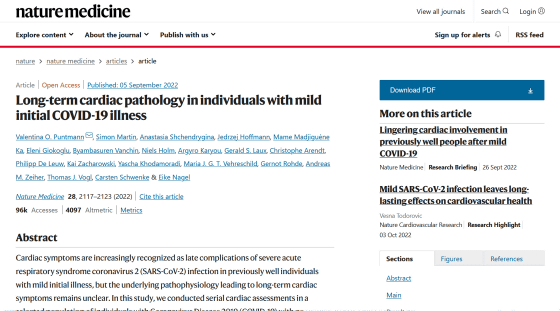Research reveals that about half of the people who developed the new corona have not fully recovered even after several months

It is known that some people who have developed a new type of coronavirus infection (COVID-19) have aftereffects such as fatigue, headache, and shortness of breath even after the virus has disappeared from the body and the main symptoms have improved. In a large-scale study that followed more than 30,000 subjects infected with the new coronavirus to investigate the aftereffects, also known as '
Outcomes among confirmed cases and a matched comparison group in the Long-COVID in Scotland study | Nature Communications
https://www.nature.com/articles/s41467-022-33415-5
University of Glasgow - University news - First results from largescale long-COVID study
https://www.gla.ac.uk/news/headline_885987_en.html
Nearly Half of Covid Patients Haven't Fully Recovered Months Later, Study Finds - The New York Times
https://www.nytimes.com/2022/10/12/health/long-covid.html
A research team led by Jill Pell , a professor of public health at the University of Glasgow , UK, will conduct a large-scale study called ``Long-CISS (Covid In Scotland Study)'' to investigate the sequelae of COVID-19 in May 2021. I am going from
In this study, 33,281 infected people who tested positive for the new coronavirus and 62,957 uninfected people, a total of 96,238 subjects, were tested six months after the onset or the first questionnaire was conducted. Follow-up was performed after, 12 months, and 18 months. Infected people included asymptomatic patients, and 31,486 subjects were symptomatic. In addition, the median age of the subjects was 45 years old, 39% were male, 91% were white, and the prior vaccination rate was about 4%.

When the responses were analyzed, 21,525 (approximately 68%) of the subjects who developed COVID-19 reported that some symptoms remained at some follow-up time. In addition, in the last survey, 1856 (about 6%) of the patients answered that they had not recovered from COVID-19 at all, and those who answered that they had only partially recovered. There are 13,350 people (about 42%), and the result is that some symptoms continue in about half.
In particular, many symptoms such as fatigue, headache, muscle pain, and shortness of breath were reported, but these symptoms are also commonly reported by subjects who are not infected with the new coronavirus. However, when analyzed considering potential factors, it was confirmed that COVID-19 patients were significantly more likely to report symptoms at follow-up. In particular, it was found that COVID-19 patients were at high risk for characteristic symptoms such as changes in smell and taste, and cardiovascular symptoms such as shortness of breath, chest pain, and palpitations.
Persistent symptoms were also more likely to occur among older people, women, people from disadvantaged communities, those with respiratory illnesses and depression, and those who were severe enough to be hospitalized at the onset of COVID-19. It was said that there were many. On the other hand, it has been reported that vaccinated people are less likely to develop symptoms such as changes in the sense of smell and taste, hearing impairment, and loss of appetite.
Pell said of the findings of this study, ``It has taught us that COVID-19 manifests differently for each individual and has more than one impact on their lives. The answer lies not only in the medical field,” he said, adding that he supports not only medical care but also problems such as work, education, poverty, and disability. argued that it was necessary to

In addition, a paper published by a German research team in September 2022 showed that patients who developed mild COVID-19 had a high percentage of heart inflammation even after nearly a year had passed since the onset. It has been.
Long-term cardiac pathology in individuals with mild initial COVID-19 illness | Nature Medicine
https://www.nature.com/articles/s41591-022-02000-0

Related Posts:
in Science, Posted by log1h_ik







